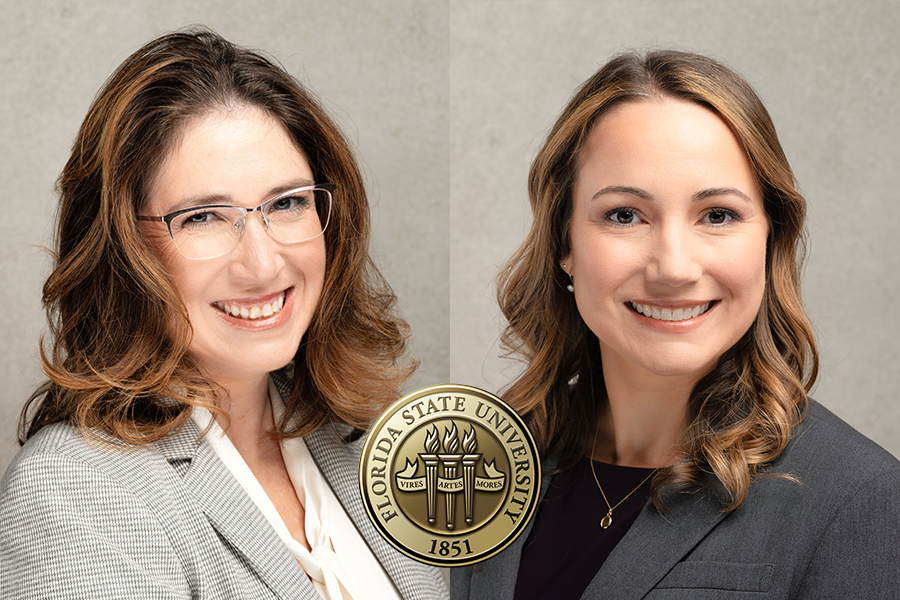
As part of its expansion of health care and clinical research, Florida State University is adding two esteemed digital health experts with long records of funding from the National Institutes of Health to its ranks.
Lisa Hightow-Weidman will begin her role as a distinguished and endowed professor on Oct. 3. Kathryn Muessig will start her role as a professor on Dec. 1. Together, they have garnered $100 million in NIH funding.
“We are delighted to welcome these distinguished researchers to Florida State,” said Provost and Executive Vice President for Academic Affairs Jim Clark. “Dr. Hightow-Weidman and Dr. Muessig have built impressive careers in the digital innovation and public health fields. As FSU continues to expand its research enterprise, particularly in health-related areas, these new faculty can help us grow while also training our students to be the researchers and practitioners of tomorrow.”
Hightow-Weidman and Muessig come from the University of North Carolina at Chapel Hill, where they co-founded and directed the Behavior and Technology Lab (BATLab), a multidisciplinary team of researchers and public health practitioners dedicated to the advancement of technology-assisted behavioral interventions focused on addressing health differences among sexual and gender minority populations.
“The FSU College of Nursing has a mission to boldly tackle challenges in how health care workers deliver the best care to patients,” said Jing Wang, dean of the College of Nursing. “Dr. Hightow-Weidman and Dr. Muessig are both accomplished researchers whose work will reinforce the college’s commitment to training the next generation of health care workers while also conducting research that promotes equitable care using novel digital solutions. We’re honored for them to join us, and I look forward to working with them both in advancing health and health care in Florida and beyond.”
“I am delighted and honored to join the Florida State University College of Nursing at this unprecedented time of growth and leadership investment in expanding and promoting health research and innovation,” Hightow-Weidman said. “I look forward to becoming an active and engaged member of the FSU family and working collaboratively across the university to further strengthen FSU’s reputation as a premier research institution.”
Muessig echoed her colleague’s sentiment, saying: “This is such an exciting time to be working in the fields of health and health care research. I am thrilled to have the opportunity to become part of the Florida State University College of Nursing team and contribute to initiatives across campus to advance FSU’s research, training and service missions to the state and beyond.”
At UNC-Chapel Hill, Hightow-Weidman served as a tenured professor of medicine at the Institute for Global Health and Infectious Diseases and a tenured professor of health behavior in the Gillings School of Global Public Health. Before arriving at UNC, where she completed a fellowship in infectious diseases, she completed her medical school training at the University of Virginia and a three-year residency in internal medicine at Stanford University.
Hightow-Weidman is an internationally renowned expert in the development, implementation and evaluation of digital health interventions to address the HIV Care Continuum for adolescents and young adults. She has been at the forefront of translating evidence-based science into digital applications, specifically through the inclusion of game-based elements, self-monitoring and tracking and provision of support to increase engagement and impact health behavior.
She is the principal investigator (PI) of five active NIH research grants, and for the past six years she has served as the PI of a grant that created the UNC/Emory Center for Innovative Technology (iTech), which is one of three research hubs that make up the Adolescent Medicine Trials Network for HIV/AIDS Interventions (ATN).
Funded by the National Institute of Child Health and Human Development, ATN is a multicenter research network devoted to the health and well-being of adolescents and young adults with or at risk for HIV. The same grant that created iTech also supported the implementation of 12 studies involving the development and evaluation of digital health interventions and novel technologies among 15- to 24-year-olds.
Hightow-Weidman is also the PI of a multi-site grant from the Centers for Disease Control and Prevention focused on the use of new biomedical HIV prevention strategies.
Muessig is a tenured associate professor in the Department of Health Behavior at UNC-Chapel Hill. She earned her doctorate in public health from Johns Hopkins University and received postdoctoral training at the UNC-Chapel Hill School of Medicine.
As a public health scientist, Muessig focuses her research on the prevention and care of HIV and other sexually transmitted infections in the United States, China and South Africa. She develops interventions combining digital health tools, behavior-change strategies and health systems navigation to decrease HIV transmission and improve health care for people living with HIV.
She is the PI of three NIH research grants, including a six-city pilot trial supporting HIV medication adherence, a national RCT testing stigma reduction to improve HIV outcomes and an implementation study to increase the availability of HIV pre-exposure prophylaxis (PrEP) in rural health clinics. Over the past six years, she has co-led the analytic core of iTech.
Hightow-Weidman and Muessig have worked together for the past 12 years on many projects at UNC-Chapel Hill and with their collaborative partners across the globe. This includes collaboration on an evidence-based digital health intervention platform that aims to impact health behaviors such as medication adherence and care engagement and is currently being tested across 10 funded studies globally.
For more information about the FSU College of Nursing, visit nursing.fsu.edu.




